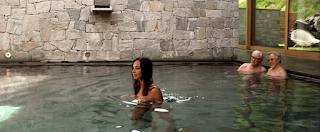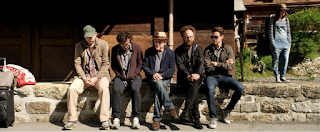Thursday, July 14, 2016
Youth
Paolo Sorrentino’s film is graced with many things: late period great performances by Michael Caine and Harvey Keitel (the latter of whom has been, ‘The Grand Budapest Hotel’ apart, ill-served by cinema this last decade or so); an eclectic soundtrack; elegant cinematography; and a cheek-by-jowl depiction of the realistic (ageing, regret, professional failure) and the surreal/metaphysical (no examples: I wouldn’t want to deprive the viewer of some delightful moments). What it doesn’t deal in is narrative.
Which is to say that there isn’t plenty go on – there is: an almost dumbfounding amount – but despite the characters’ clearly, even contrivedly, mapped interrelationships, there isn’t the inextricable interweaving of, say, ‘Short Cuts’ or even a sense of disparate material finding its rhythm and aesthetic in the editing room à la ‘Cloud Atlas’. Instead, we have a group of moderate-to-extremely eccentric people holed up at a spa in the Alps, some of whose lives have parallels, to varying degrees, with others’.
The guest list at this swish Swiss establishment includes a veritable roster of the famous and once-famous. We have Fred Ballinger (Caine), a composer remembered chiefly for his most throwaway work; Mick Boyle (Keitel), a film director trying to complete the script and drum up financing for a movie that might well be his last; prissy method actor Jimmy Tree (Paul Dano); corpulent former football legend Diego Maradona (Roly Serrano); and the newly crowned Miss Universe (Mădălina Diana Ghenea). Ballinger and Boyle are old friends and romantic rivals, a relationship further intertwined by the impending nuptials between Ballinger’s daughter Lena (Rachel Weisz) and Boyle’s son Julian (Ed Stoppard). Nuptials that get swiftly demoted from impending to ain’t happening when Julian throws over Lena for Paloma Faith (gamely playing a version of herself that the script is unflattering about to put it mildly).
As ‘Youth’ opens, Ballinger is visited the Queen’s emissary (Alex Macqueen), who implores him to conduct his most famous composition, ‘Simple Songs’, at a gala performance. Ballinger refuses for reasons he is reticent to cite. Of course, Ballinger recanting and the film reaching its denouement with said concert is a no-brainer. The two hours in between don’t so much sketch in the circumstances of Ballinger’s volte face as gently suggest them, mainly by playing him off against the spa’s various other residents in a series of wanly observed vignettes.
There’s the contrast between Ballinger and Boyle: the former retired and happy to have shucked off the highs and lows of creativity, the latter still desperate to complete another work. In a surreal moment late in the film, Boyle – rejected personally and professionally by his leading lady of many years, Brenda Morel (Jane Fonda) – hallucinates an alpine hillside full of the various actresses he worked with, all of them still young while he’s an old man, all of them garbed as they were in his films; just from their delivery of the hamfisted dialogue he saddled them with, it’s clear that Boyle wasn’t that great a filmmaker, that he stumbled from one low-budget no-hoper to the next purely to give a leading role to whichever B-movie beauty was his muse at any one time.
There’s the nexus of personal revelation shared by Ballinger and Tree: both are remembered for just one work – the composer for what was little more than a practice piece, the actor for playing a robot in a trashy sci-fi movie. Both have their dignity returned to them by children who are completely un-awed to meet them: a budding violinist who accepts that while Ballinger’s ‘Simple Songs’ are indeed simple, the simplicity is the key to their beauty; and a young film fan who rubbishes the robot movie and tells Tree that it was his delivery of one single line in a low-key family drama that proved his brilliance as an actor. Sorrentino is wise enough to let these rhymed scenes develop slowly and play them with absolute understatement. Much of ‘Youth’, when pinned down on the page in the context of a review, borders on the hokey. Many a director would have made a pig’s ear of it. (But again, no spoilers.)
There’s the shared moment of transcendentalism which sees an eastern mystic achieve nirvana and Maradona rediscover his old calling, no on a football field, but with a tennis ball on an immaculate court. There’s the contrast between Paloma Faith’s raucously unsubtle pop video and an amateur but heartfelt band performing Florence and the Machine’s ‘You’ve Got the Love’. There’s the experiential spectrum between Boyle’s idealistic young writing team and the world-weary pragmatism of Boyle himself. There’s the juxtaposition between Lena’s budding new relationship with a mono-emotional mountain climber and Boyle hiring the services of a young hooker only to task her to take a twilight walk with him. And there’s the stony-faced couple who take dinner every evening without saying a word to each other, who become a blank canvas upon which everyone else’s interrelationships are projected.
‘Youth’ winds its way to its inevitable but emotionally earned conclusion with all the affable digressiveness of a shaggy dog story, albeit one told by a once-great raconteur for whom this will be his last soliloquy of any real meaning. There is a great deal of melancholy here, but it’s offset by an acidic delight in the idiosyncrasies of its characters. The performances, without exception, are buoyant. Dano is the best he’s been since ‘Little Miss Sunshine’ and ‘There Will Be Blood’, Weisz is pitch-perfect, Macqueen steals both of his scenes with the polish of a jewel thief absconding with a priceless diamond, and Caine and Keitel’s double act is a wondrous thing to behold. How to describe it? Imagine a Jack Lemmon/Walter Matthau comedy reconceptualised by Lone Scherfig. Imagine, too, the best cinematic statement on ageing this side of ‘The Straight Story’. That’s ‘Youth’ for you – and don’t go thinking that the title is a bit of cheap irony. Sorrentino gives the explanation for it to one of the more subsidiary characters but the meaning is no less profound.
Labels:
Harvey Keitel,
Michael Caine,
Paolo Sorrentino,
Paul Dano,
Rachel Weisz
Subscribe to:
Post Comments (Atom)









































No comments:
Post a Comment